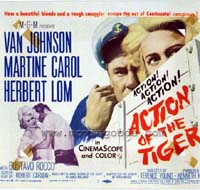| Action of the Tiger | |
|---|---|
 Original film poster | |
| Directed by | Terence Young |
| Screenplay by |
|
| Based on | Action of the Tiger by James Wellard |
| Produced by | Kenneth Harper |
| Starring | |
| Cinematography | Desmond Dickinson |
| Edited by | Frank Clarke |
| Music by | Humphrey Searle |
Production companies |
|
| Distributed by | Metro-Goldwyn-Mayer [1] |
Release dates |
|
Running time | 93 minutes |
| Country | United Kingdom |
| Language | English |
| Budget | $863,000 [2] |
| Box office | $1,640,000 [2] |
Action of the Tiger is a 1957 British CinemaScope action film directed by Terence Young and starring Van Johnson and Martine Carol. It was distributed by MGM.
Contents
The plot is about the rescue of a political prisoner held in Albania. Carson, played by Van Johnson, is an American contraband runner approached by Tracy Mallambert, a French woman who wants him to help rescue her brother Henri. The supporting actor Sean Connery would reunite with director Terence Young for the first film in the James Bond series, Dr. No (1962). The title comes from William Shakespeare's play Henry V . [3]